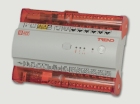Trend controller has small footprint but is big in features

Trend’s IQ422 controller has multi-browser support and is claimed to have the smallest footprint (116 x 158 mm) for a 12-point universal controller. The IQ422 is the second variant in the family of IQ4 main-plant controllers and builds on the success of the recently launched IQ41x series. Data can also be accessed via mobile devices such as smart phones and tablets, with information being presented in the correct format automatically.
In response to customer requests for a flexible device , this new controller uses the popular formation of six inputs and six outputs, making it suitable for small to mid-size applications such as primary schools and health centres, as well as larger installations such as multi-tenanted office complexes.
Various features simplify installation, engineering and commissioning. These controllers are particularly suitable for the energy-efficient highly distributed local control of services such as underfloor heating, natural ventilation, boiler plant, variable-temperature circuits, air-handling units and air-conditioning terminal units.
The IQ422 provides a state-of-the-art upgrade to IQ222 and IQ3xact products and comes in 24 and 230 V variants in DIN-compatible casework.
Networking is via TCP/IP, and XML capability is standard.








